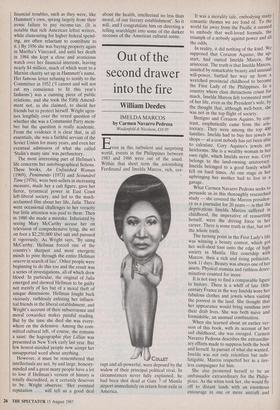Scoundrel time has finally come
Paul Johnson
LILLIAN HELLMAN: THE IMAGE, THE WOMAN by William Wright
Sidgwick & Jackson, £15
Lillian. Hellman was famous, or noto-
rious, for many things: as the first major American woman playwright, as the lover, Companion and eventual nurse of the stricken Dashiell Hammett, as a Soviet apologist and victim of the 1950s witch- hunt, as a best-selling autobiographer and New York literary tigress, and finally as a thundering liar. Her life was long, com- plex, filled with incident and the record of it obfuscated by her cunning fictions. Sort- ing it all out is a difficult business and William Wright has certainly not written the last word about it. Indeed at various points he confesses himself unsure or baffled. But he has done a manful job of excavation and disinterment, for which future historians of the period will be grateful (he identifies various Heilman lies which have passed into the record, eg in Carlos Baker's life of Hemingway), and he has unquestionably produced a fascinating if gruesome book.
The solidest elements of the Hellman reputation are her 1930s plays. She came from a middle-class New Orleans Jewish background, identifying with her lively father Max, a failure and a cheat, rather than her dull, solidly successful relations on her mother's side, the Newhouses and Marxes. It may be that this preference tipped her towards the anti-capitalist Left. In New York she grubbed around in the literary molehills, acquired a half- successful husband, then chucked him for Hammett, who hit the jackpot with The Maltese Falcon in 1930. Hammett was a communist, a drunk and a blocked writer, who just contrived to extrude The Thin Man in 1934, then wrote nothing for the rest of his life. But he gave Hellman ideas. He put her onto the book (never acknow- ledged) describing the 1811 Scottish case which inspired The Children's Hour, her first hit. He helped her to write The Little Foxes, her best play, based on her New Orleans memories, and other works; and it is a revealing fact that, after his death, she
never had a serious stage success. Nonetheless, she had an undoubted gift for inventive drama -- that was part of her moral problem, indeed — and some of her plays seem likely to survive.
Her claim to moral stature for looking after poor Hammett, who went to gaol in 1951 for refusing to testify to the House Unamerican Activities Committee, seems more dubious. She later capitalised on her devotion to him but each pursued different amours throughout their supposed connec- tion and she clearly exaggerated the close- ness of their liaison. Indeed, when he died, Gore Vidal summed up the doubts of many in a famous query: 'Did anyone ever see them together?' More disturbingly, Wright shows that Hellman, in conjunction with her lover and financial adviser Arthur Cowan, devised an elaborate scheme enabling them to acquire Hammett's liter- ary estate, which became immensely valu- able. This involved cheating Hammett's daughters out of the bulk of their inheri- tance. In due course, when Cowan died, she got his half of the proceeds and cheated his heirs too — all quite legally, of course. Nor, from Wright's account, does she come well out of the 1950s witchhunt. She claimed that both she and Hammett were ruined financially by the anti-communist crusade, and it is true she had to sell her farm in Westchester. But she retained a valuable brownstone in New York and her financial troubles, such as they were, like Hammett's own, sprang largely from their ironic failure to pay income-tax. (It is notable that rich American leftist writers, while clamouring for higher federal spend- ing, are often reluctant to contribute to it.) By 1956 she was buying property again in Martha's Vineyard, and until her death in 1984 she kept a close and avaricious watch over her financial interests, leaving nearly $4 million, much of which went to a Marxist charity set up in Hammett's name. Her famous letter refusing to testify to the Committee in 1952 CI cannot and will not cut my conscience to fit this year's fashions') was a cunning piece of public relations, and she took the Fifth Amend- ment not, as she claimed, to shield her friends but to protect herself. Wright agon- ises lengthily over the vexed question of whether she was a Communist Party mem- ber but the question is really academic. From the evidence it is clear that, in all essentials, she was a faithful servant of the Soviet Union for many years, and even her eventual admission of what she called `Stalin's many sins' was perfunctory.
The most interesting part of Hellman's life concerns her autobiographical fictions. These books, An Unfinished Woman (1969), Pentimento (1973) and Scoundrel Time (1976), were best-sellers in increasing measure, made her a cult figure, gave her fierce, tyrannical power in East Coast left-liberal society, and led to the much- acclaimed film about her life, Julia. There were occasional challenges to her veracity but little attention was paid to them. Then in 1980 she made a mistake. Infuriated by seeing Mary McCarthy accuse her on television of comprehensive lying, she set on foot a $2,250,000 libel suit and pursued it vigorously. As Wright says, 'By suing McCarthy, Hellman forced one of the country's sharpest and most energetic minds to pore through the entire Hellman oeuvre in search of lies'. Other people were beginning to do this too and the result was a series of investigations, all of which drew blood. In particular, the original of Julia emerged and showed Hellman to be guilty not merely of lies but of a moral theft of unique dimensions. Hellman fought back viciously, ruthlessly enlisting her influen- tial friends in the liberal establishment, and Wright's account of their subservience and moral cowardice makes painful reading. But by the time she died she was every- where on the defensive. Among the com- mitted cultural left, of course, she remains a saint: the hagiographic play Lillian was presented in New York early last year. But few honest-minded people now accept her unsupported word about anything.
However, it must be remembered that intellectuals are not, by and large, honesty- minded and a great many people have a lot to lose if Hellman's version of history is totally discredited, as it certainly deserves to be. Wright observes: 'Her eventual reputation . . . will tell us a good deal about the health, intellectual no less than moral, of our literary establishment'. So it will, and I congratulate him on directing a telling searchlight into some of the darker recesses of the American cultural scene.



















































 Previous page
Previous page